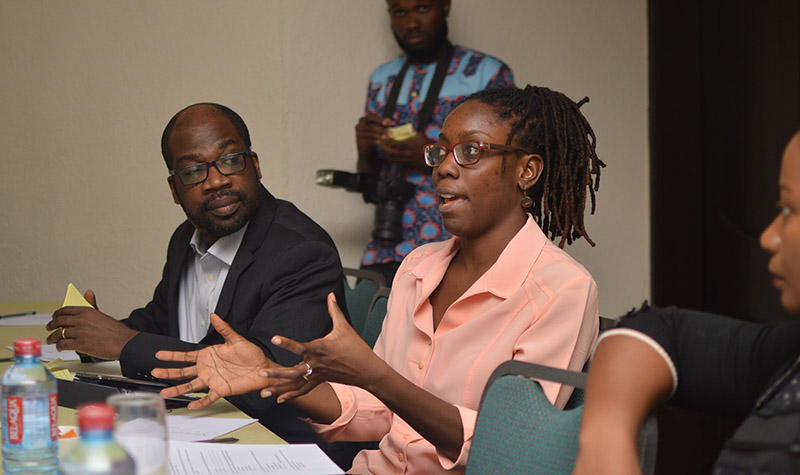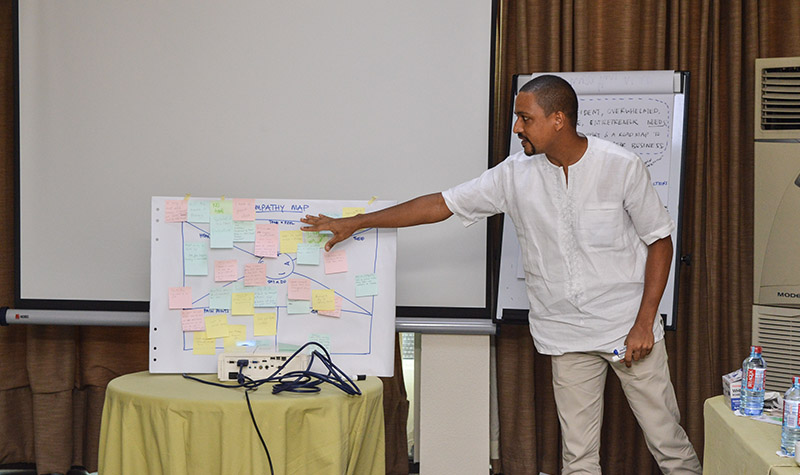 March 9, 2016
March 9, 2016
Faculty and staff from Ashesi engaged with a cross section of professionals from the finance and investment sectors in Ghana, to brainstorm curriculum formats for the Ghana Climate Innovation Center (GCIC).
In order to engage the incubatees of the GCIC in a strong incubator program, the team from Ashesi is currently developing curriculum for courses and modules that will better equip the incubatees to build their ventures for funding and scalability. The session, led by Fred McBagonluri, Head of Engineering School and Executive Director of the GCIC, involved dialoguing with the industry professionals in shaping the setup of the GCIC curriculum.
“Future graduates from the GCIC will have to access funding from financial facilities as well as build business relationships with the thriving venture capital, financial and entrepreneur communities in Ghana,” he said. “It is therefore important to include these stakeholders in shaping ultimate outcomes for these graduates. The question that the session was intended to address was: what basic knowledge should graduates from GCIC have in order to be: the right future clients of your facility and also to be successful as entrepreneurs and leaders of their communities?”

Following the dialogue session, some members of Ashesi’s faculty led a design thinking session aimed at building frameworks that will guide the caliber of incubatees who would be admitted to the innovation center.
“We needed to get an understanding of who a GCIC incubatee is and how to engage with them in the training program,” said Dr. Gordon Adomdza of the Business Administration Department. “So we used an empathy map to characterize them and a journey map to get a sense of their experience points in a training program. Compared to a typical brainstorm session, using the empathy map and journey maps made for a more structured and empathetic conversation which also gave us a few aha moments because people were suddenly thinking about the incubatee in ways they had not before.”
 Ahead of the launch of the GCIC, the session also served as an opportunity to gauge the interests of the professionals with regards to the kind of technologies they expect to see come out from the GCIC.
Ahead of the launch of the GCIC, the session also served as an opportunity to gauge the interests of the professionals with regards to the kind of technologies they expect to see come out from the GCIC.
“The establishment of GCIC is timely because Ghana and indeed the developing world desperately needs commercially viable and sustainable alternative solutions for the power, water, agriculture and waste management sectors,” said Mirabelle Moreaux, Investment Director at Injaro Investments. “The success of the GCIC will hinge on how many of the participants’ ideas ultimately receive venture capital funding to be scaled up. As such, having the feedback of the venture capital or private equity partners to design a practical program ensures that factors that inform the investment decision-making process are addressed for each participant.”
The objective of the Ghana Climate Innovation Center is to establish local institutional capacity to support Ghanaian entrepreneurs and new ventures involved in developing profitable and locally-appropriate solutions to climate change mitigation and adaptation. Through its programs, activities and financing, the GCIC and its network of partners and stakeholders will provide a country-driven approach to solving climate, energy and resource challenges and support economic development through job creation.
Share this story
